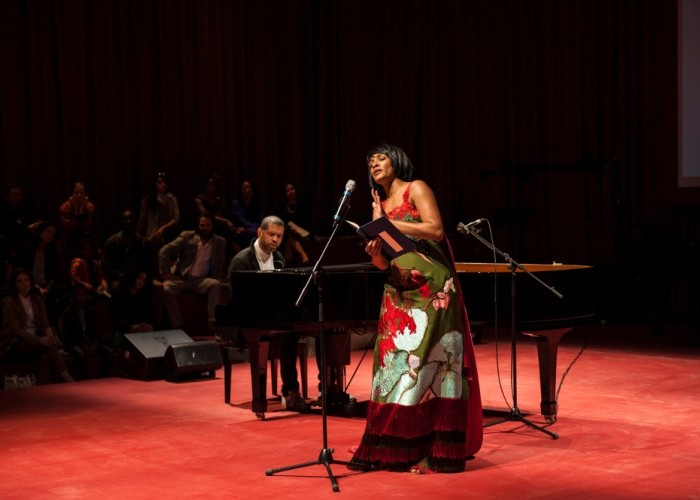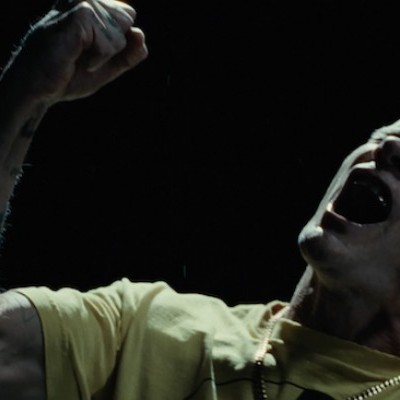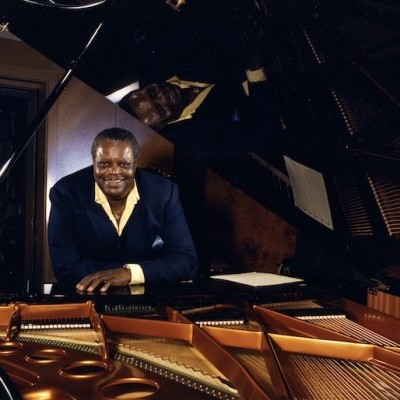Dec 9, 2025 12:28 PM
In Memoriam: Gordon Goodwin, 1954–2025
Gordon Goodwin, an award-winning saxophonist, pianist, bandleader, composer and arranger, died Dec. 8 in Los Angeles.…

Jason Moran and Alicia Hall Moran perform at the 2015 Venice Biennale in Italy.
(Photo: Venice Biennial)AHM: Now in music conservatory, studying opera, I was having my mind blown by having to study the [writers] of the poems that these canonical classical composers had set their music to. Because in the classical tradition, you don’t sing words where you don’t know where they came from. You can’t just start singing the way you heard Kathleen Battle sing it on the record. You can tell me about the composer and his times and you can tell me about the librettist. You get in front of the class and say, “I’m going to sing something by Mozart, poem by so-and-so.” Then you go through the translation word by word.
in jazz During the ’80s, this burden-of-history problem arose, where it seemed like there were warring positions between those who wanted to do it like the masters and those who wanted to innovate.
AHM: You got lucky with Greg Osby because he just took a scissors to all that.
JM: Also seeing and having a relationship with the generation ahead, with Muhal Richard Abrams and the AACM, and recognizing what that was all about. We’d go to those AACM concerts when we were in college, and they were making it themselves, operating on their own dime, not in no jazz club. And they showed there was another tributary where the music was being distributed, and it always felt a different kind of way than going to the Village Vanguard. …
One thing for [Muhal] was that there was no reason to ever complain. He may have told other people other shit, but his big thing with me was, “No one will ever come into your house and take your hands off of your piano.” That’s ownership. … He was like, “I don’t need you to accept the whole thing. It’s cool, I’m working on my work. And I support your work, too. I don’t need your approval and I support your work, too.” And that’s consistent for that crew.
Those are the kind of people we want to be around—people who focus on the work. Adrian Piper, Joan Jonas. People who despite being overlooked for a very long time get the depth of what we’re sacrificing to make work. And shit is hard. So if we can support each other, then maybe it can get stronger. We take away gems from these collaborations that make us stronger whenever we get up on stage.
AHM: I allow people to change me when I do collaboration. I think sometimes people don’t want to be changed, so those collaborations just become experiences you have. But the ones that hold are when the person wants to be changed. For some people, when they feel their identity slipping away from them, that’s like a death in the night. But that’s where I jump in.
When I went to work with Bill T. Jones, I thought, “This will rip up my voice. OK, so it’s time to get my voice all ripped up.” Because I know who this is and I know what he makes and I love it. And ain’t no other Black woman in this room singing, so this is for me, so give him everything. My voice has an imprint of all these places I’ve been. ...
A few years ago, the artist Simone Leigh told me, “I’ve heard of everybody you’ve worked with but I’ve never heard of you,” and by the end of that conversation she taught me the word “authorship.” She told me, “You need authorship.” So I’m making a record, so people can hear the voice I have because my voice is dying. I have maybe 10 years left.
How do you read yourselves in terms of authorship, signature, a legacy—what are you putting between those covers now?
AHM: I grew up in my mother’s house, and my mother is a book editor. I’ve seen her throw three-quarters of a manuscript in the garbage and say, “Now, we start here.” And that’s my whole answer to that. Because you overstand what that is—it’s a whole different process.
You’re talking about your voice as something that’s going to be lost—that implies you already have some sense of what it’s generating, what its value is.
JM: Alicia’s two records are hers. They didn’t exist before her, and they took a long time. Time for Alicia to understand why she was singing those songs, why she heard them the way she did in her head and why she hadn’t heard anyone else do that is because they couldn’t. And accepting that those things she heard did belong together—that Stevie Wonder’s “Signed, Sealed, Delivered” does need to meet Carmen, because Black folk do know that history, too. Why do we act like those things are so far apart? And why do we keep them so far apart? Alicia eliminated that with this record in a way I don’t think I’ve ever heard done before.
I’d like to hear you talk about your families’ impact on your creative process and being raised to be in service to Blackness, to Black Consciousness.
JM: I grew up in the Third Ward in Houston—same neighborhood as Beyoncé and Solange grew up in. I was not aware of how I was being raised until I left. In the ’80s, there was a way that music was used to empower that. You were taught that there were items of our culture to be shared. And every once in a while, your teachers would let you know you were getting something not everyone else was being given—trusting that you wouldn’t [mess] it up.
Just like Andrew Hill would call every once in a while and say, “You know I’m not giving this to everybody,” and then hang up! [laughs] So you knew you were being given items of our culture to be shared later. Be careful when those opportunities show up.
Talk about the project with the Chicago high school kids that’s coming out.
JM: Willie Pickens—beautiful dude, God rest his soul—saw me at the Chicago Jazz Festival in 2014 and asked me to come see these kids from this South Side after-school music program that his daughter Bethany directs at Kenwood Academy. You saw that the parents were invested and took time to make sure they got to the Kenwood Academy program for three hours, three times a week. I already had this commission in Chicago that I didn’t know what I was going to do with. But seeing those kids I thought, “What if, instead of writing music for some famous saxophonist to come and play—what if I write it for these 40 kids, and they play with my band?”
But then, while I was writing the music, one of the kids in the orchestra was murdered [15-year-old guitarist Aaron Rushing]. He had been in class with them and now he wasn’t there for the concert. It was emotional. Also because it made them think about there being this great concert hall in their city that they had never been invited into. Then I brought them to the Kennedy Center [in Washington, D.C.], and took them into the studio—and paid all the students—and we made a record. It reminded me that when I was in high school I had great things happen—meeting people like McCoy Tyler and Kirk Lightsey. I thought, I hope these kids think that was a cool situation and they remember it 25 years from now.
Talk about your work with Georgia AnnE Muldrow re-interpreting Mingus.
JM: Georgia has this very liberated voice—from the bottom to the top. She understands music unlike anybody else I know, and her voice puts sounds together unlike anybody else I know. She plays some unbelievable piano. … Georgia Anne really challenges me and the group and the audience when she performs. People don’t leave the same as when they came in. During our Chicago run, we were in the middle of this Mingus concert and she suddenly pulled up this statement from her depths: “How can you love Black music and not love the Black story?” The band needed to hear that, and the audience needed to hear that, too.
When Alicia came to Manhattan School of Music she didn’t know, like I didn’t know—because this is another thing not taught in conservatory—how women are eliminated from things from the jump. Point blank. Especially in jazz. She just kept pointing it out to me over and over again.
That’s a flashpoint now.
JM: And those conversations will continue. But I also feel like for me, now it’s also about enabling authors, too. The only reason I’m here is because somebody said, “You should be heard, too.” So I better turn my ass right around and keep those doors open.
AHM: You can’t keep any of that for yourself. It’s such a myth.
JM: Greg, you were a part of the BLEED program Alicia and I did for two weeks at the Whitney Museum. They just asked for me and Alicia to do something, but we brought in 100 other people to present with us over those two weeks. Because we know how important that kind of recognition is for a community.
AHM: And the fact that they asked for both of us allowed us to say, “We’re going to make something amazing for you.” Because that showed—
That it ain’t “jazz”! [Laughs].
JM: And back to that original question of, “Is jazz as we know it enough, or is singing enough?” I feel like the people that we looked at were always showing us that it wasn’t enough, and that it really was “beyond category.” Like me going with Alicia’s mother to meet the painter Emilio Cruz and his wife, Pat Cruz, and them talking about knowing Andrew Hill, and me saying, “Hey, that’s my teacher.”
AHM: You hadn’t met him yet. You met him because of Pat and my mother taking you to meet her, and then Pat introducing you to Andrew Hill. And you don’t know how to say it because it was a woman who made it happen.
JM: I think by that time that I had met Andrew through Greg Osby.
AHM: You were one in a billion when you met him with Greg. You got to know the private side of Andrew Hill because of my mother knowing Pat Cruz. That’s why I get so ticked off about people saying how things happen. Like in the magazines you’ll say, “Well, I met Andrew Hill and he told me … ,” and the women will be eliminated. People don’t realize if they don’t keep the women around and keep them happy, they’re going to be locked out of all these opportunities. DB

Goodwin was one of the most acclaimed, successful and influential jazz musicians of his generation.
Dec 9, 2025 12:28 PM
Gordon Goodwin, an award-winning saxophonist, pianist, bandleader, composer and arranger, died Dec. 8 in Los Angeles.…

Flea has returned to his first instrument — the trumpet — and assembled a dream band of jazz musicians to record a new album.
Dec 2, 2025 2:01 AM
After a nearly five-decade career as one of his generation’s defining rock bassists, Flea has returned to his first…

Belá Fleck during an interview with Fredrika Whitfield on CNN.
Jan 13, 2026 2:09 PM
The fallout from the renaming of the John F. Kennedy Center for the Performing Arts to include President Donald…

“It’s a pleasure and an honor to interpret the music of Oscar Peterson in his native city,” said Jim Doxas in regard to celebrating the Canadian legend. “He traveled the world, but never forgot Montreal.”
Nov 18, 2025 12:16 PM
In the pantheon of jazz luminaries, few shine as brightly, or swing as hard, as Oscar Peterson. A century ago, a…

Dec 11, 2025 11:00 AM
DownBeat presents a complete list of the 4-, 4½- and 5-star albums from 2025 in one convenient package. It’s a great…